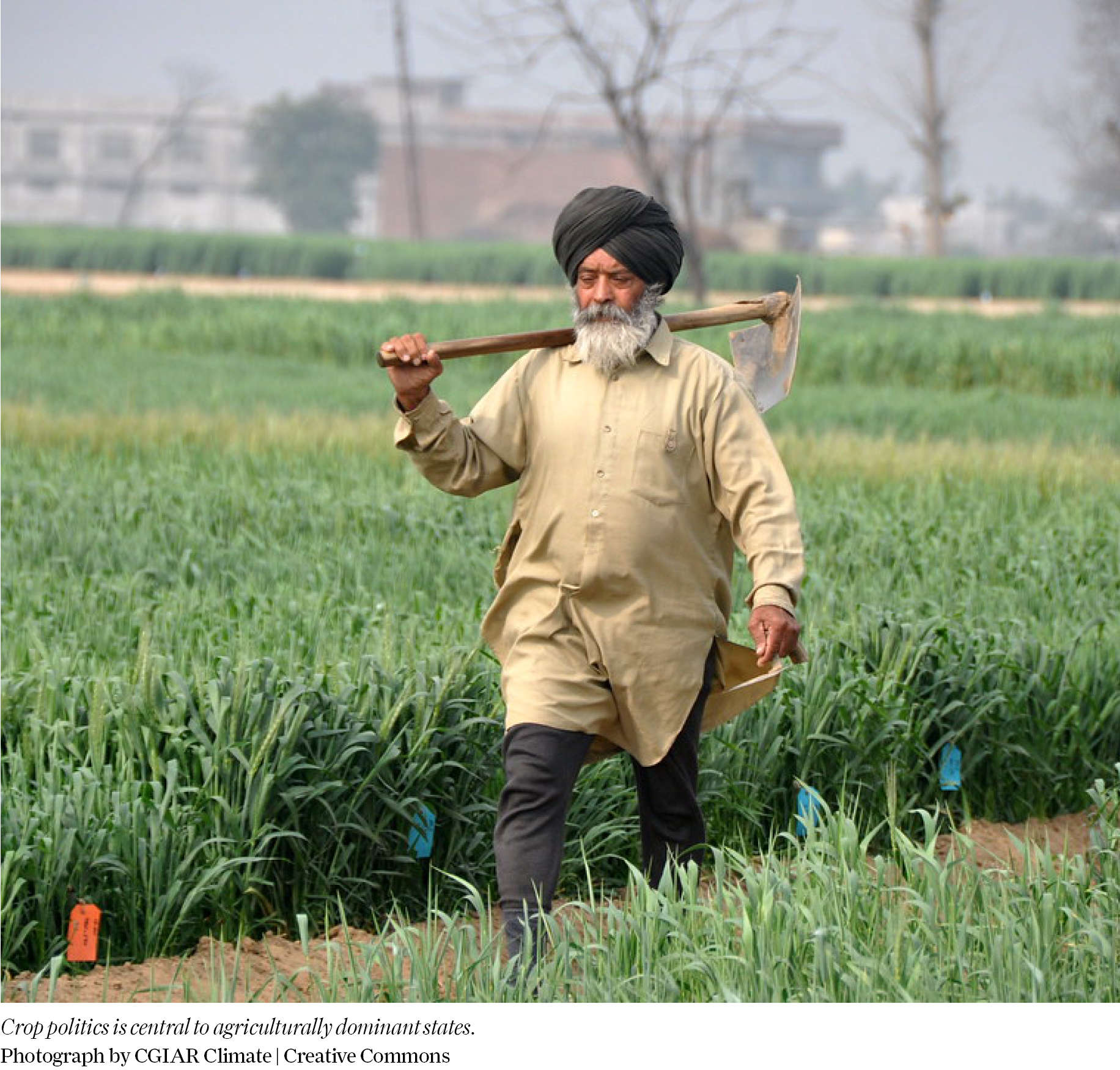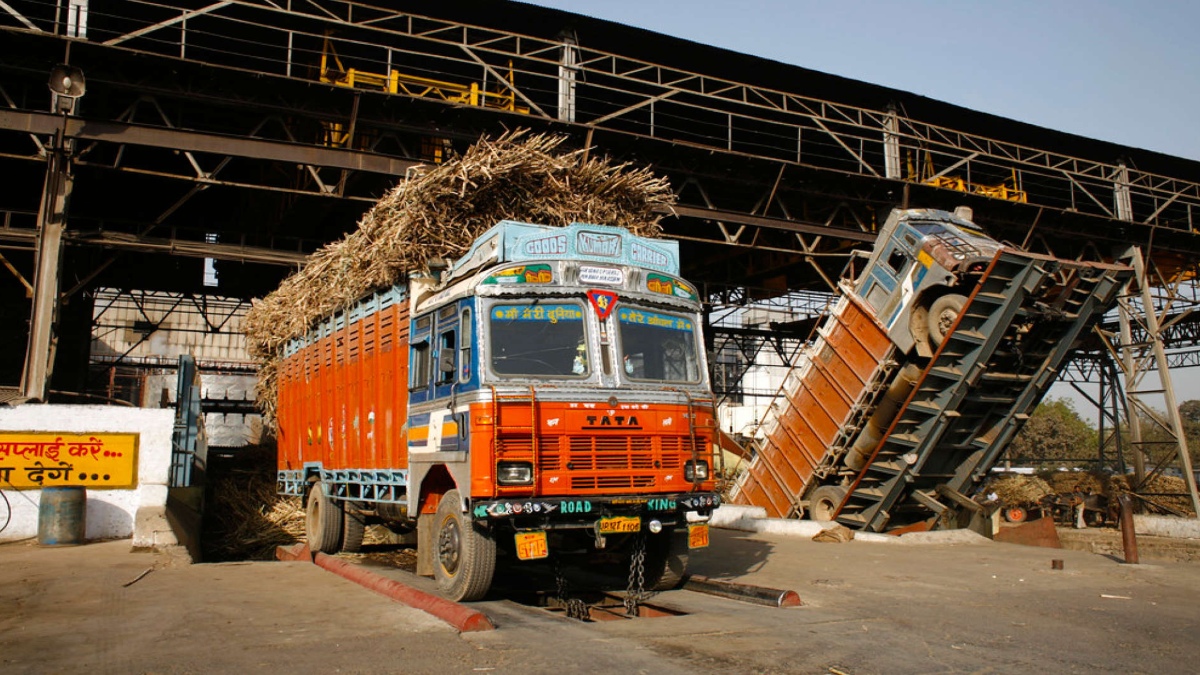A year after the start of the farmers’ protest around the borders of the capital, hundreds of farmers continue their fight, expressing their discontentment against the three new farm laws passed by the central government. The farmers’ disgruntlement with the central and other state governments is likely to dominate the electoral discourse in the poll-bound states of Punjab, Uttar Pradesh, Himachal Pradesh, and Uttarakhand. Assembly elections in all these states are scheduled to be held in 2022. The issues of farmers, and agriculture overall, which dominate the economy in the states of Punjab, Uttar Pradesh, and Himachal Pradesh, have always been used as a major poll plank by the opposition and ruling parties. The issue of sugarcane cultivation and non-payment of dues has always been at the forefront in discussions around the politics of Uttar Pradesh, while the issues of farmer’s suicides and falling incomes have dictated Punjab politics in recent years.

GANNA POLITICS IN UTTAR PRADESH
Western Uttar Pradesh is known for farming and politics of sugarcane.
Photograph by Land Rover Our Planet | Creative Commons
Western Uttar Pradesh is referred to as the sugarcane belt of India, and the sugarcane economy in the state is estimated to be around Rs. 40,000 crore, directly employing about 4 million farmers’ households. UP is the highest sugarcane producer in the country, with about 22.77 lakh hectares under sugarcane cultivation and a yearly output of 135.64 million tonnes.
In India, the sugarcane industry is highly regulated by the government. The government decides the procurement price, minimum selling price (MSP), monthly sales quota of mills, and annual export volumes of sugar. Unlike other staple food grains, sugarcane is not directly procured by government agencies and sugar inventory is also not maintained by the Food Corporation of India (FCI) or any corresponding state government agencies. The hot topic regarding the sugarcane industry and farmers in the past few elections has been the non-payment of dues to sugarcane farmers.
The non-payment of sugarcane dues by mills has been a perennial issue for Uttar Pradesh’s farmers where there are a number of delays and often only a fraction of the payments are made. In the run-up to the 2017 Assembly Elections, sugar mills owed farmers around Rs. 4,000 crores for the 2016-17 season and an additional Rs. 6,600 crore for the 2015-16 season. The Samajwadi Party (SP) in 2016 decided to waive Rs. 2,000 crore owed by the sugar mills, causing widespread agitation amongst farmers.
The Bharatiya Janata Party (BJP) government, taking advantage of the growing anger against the SP government, promised the clearing of all sugarcane dues within 14 days of coming into power. While the current BJP government has said it has cleared around 80.45% of all sugarcane dues so far, the total dues sugar mills owed were estimated to be around Rs. 11,000 crores for the 2020-21 season (till the end of June 2021). The issue of sugarcane dues and the MSP of the crop will continue to be a major electoral issue for the upcoming elections. In a recent speech, former Chief Minister Akhilesh Yadav from the SP attacked the Yogi Adityanath government’s treatment of sugarcane farmers. Farmers have also been disappointed with the decision to not increase the state advisory price (SAP) of sugarcane. After coming to power in March 2017, the BJP government in the state had increased the SAP for sugarcane by Rs 10, however, since then the prices have remained unchanged. Farmer groups and trade unions said they have expected an increase in the SAP for the upcoming year, in light of the UP Assembly Elections.

PUNJAB: HUB OF FARMERS AGITATION
The state of Punjab, also referred to as the food basket of India, is a majorly agrarian state, and agriculture plays a very important role in the culture and economy of the state. While the major crops grown in the state vary regionally, the two cereal crops, wheat and rice, which are grown in rotation during the year dominate the politics of the state. In 2012, Punjab rolled out the state’s first agricultural policy, aiming to make farming economically viable as a profession. The policy laid out the ways in which farmers’ incomes could be improved, and also pushed on the agenda of crop diversification. The main aim of this was to bring down the area under paddy cultivation, as paddy crop requires a lot of water and affects soil fertility.
For the 2022 Assembly Elections, the farmer’s protests which have been ongoing near the borders of New Delhi have taken centre stage. Leaders of the Samyukta Kisan Morcha (SKM), Bharatiya Kisan Union (BKU), AIKS (All India Kisan Sabha), and other major farmers’ organisations have been collectively protesting at the borders of the capital against the “anti-farmer” laws introduced by the central government. The disgruntlement with the BJP has been growing across farmers in the country, but especially in Punjab, and has already cost the party its 23-year-old alliance with the Shiromani Akali Dal (SAD).
The BJP, which has never been able to secure (individually) more than 9.63 percent of vote share in the Lok Sabha in any previous elections in Punjab is now struggling to find support in the state for the upcoming assembly elections. The anger of the farmers and the impact of the farmer’s protests was also visible in the results of the municipal elections in the state in February this year, whereby Congress swept the polls. The Indian National Congress (INC) won 98 out of 109 municipal councils and Nagar panchayats and seven out of eight big municipal corporations that went for polls.

ORCHARDISTS OF HIMACHAL PRADESH
Agriculture is a major contributor to the economy of Himachal Pradesh as well. The state is set to go to the polls in late 2022. Around 90 percent of the state’s population continues to reside in rural areas, out of which 62 percent are associated with agricultural activities and are dependent on agriculture for survival. Overall, agriculture and allied sectors contribute to around 12.73 percent of the state’s gross domestic income. However, apple producers and other farmers from the hill state seemed to be missing in action at the protests taking place across the country.
Over the last few months, apple farmers have demanded that their produce be brought under the MSP purview as well, as they continue to face growing challenges such as inflation included by the COVID-19 lockdown. Farmers and orchardists have also stated that roads and connectivity, which is imperative for the supply and sale of produce, end up being an election issue, while no action has been taken to improve connectivity. Orchardists state that nothing has been done to improve the state of the Theog-Hatkoti Road, which leads to Rohru and also passes through Jubbal-Kotkhai, thus connecting the apple belt. Non-payment of apple dues is also a major problem. Dozens of apple farmers across the state are yet to get roughly Rs 100 crore in dues from buyers and commission agents who purchased the last two years’ produce, according to the Kisan Sangharsh Samiti, a Shimla-based fruit-growers action group leading their campaign for payments (2019).
Himachal Pradesh, which is known for its apple economy, has also emerged as a major vegetable producer in the past few years. In the lead-up to the 2019 Lok Sabha elections, vegetable farmers in the state protested against the BJP government, accusing them of ignoring their problems. They alleged that they were facing widespread problems such as the absence of a mechanism for minimum support price (MSP), lack of cold storage and food processing units and monkey attacks on uninsured crops in farms.
RISING DISCONTENT IN UTTARAKHAND
The BJP, which swept the state assembly elections in 2017, winning 57 out of the 70 seats with a vote share of 47 percent, faces an uphill task in the state against the Indian National Congress (INC), which won 11 seats in the last assembly elections with a vote share of 33.8 percent. Both parties have been using the momentum of the ongoing farmers’ protests to attack each other. While the Congress has been organizing marches and rallies against the BJP’s farm laws, the BJP government on the other hand is accusing the Congress of misleading the farmers regarding the new farm laws. Another main issue in the state is that of providing relief from farm debts to small and border area farmers. The state BJP president Madan Kaushik said that the government has fulfilled 85 percent of the promises made in the manifesto, but it is yet to fulfil the promise of providing relief from farm debts to small and border area farmers.


Contributing reports by Damini Mehta, Junior Research Associate at Polstrat and Damayanti Niyogi & Abhinay Chandna, Interns at Polstrat.







